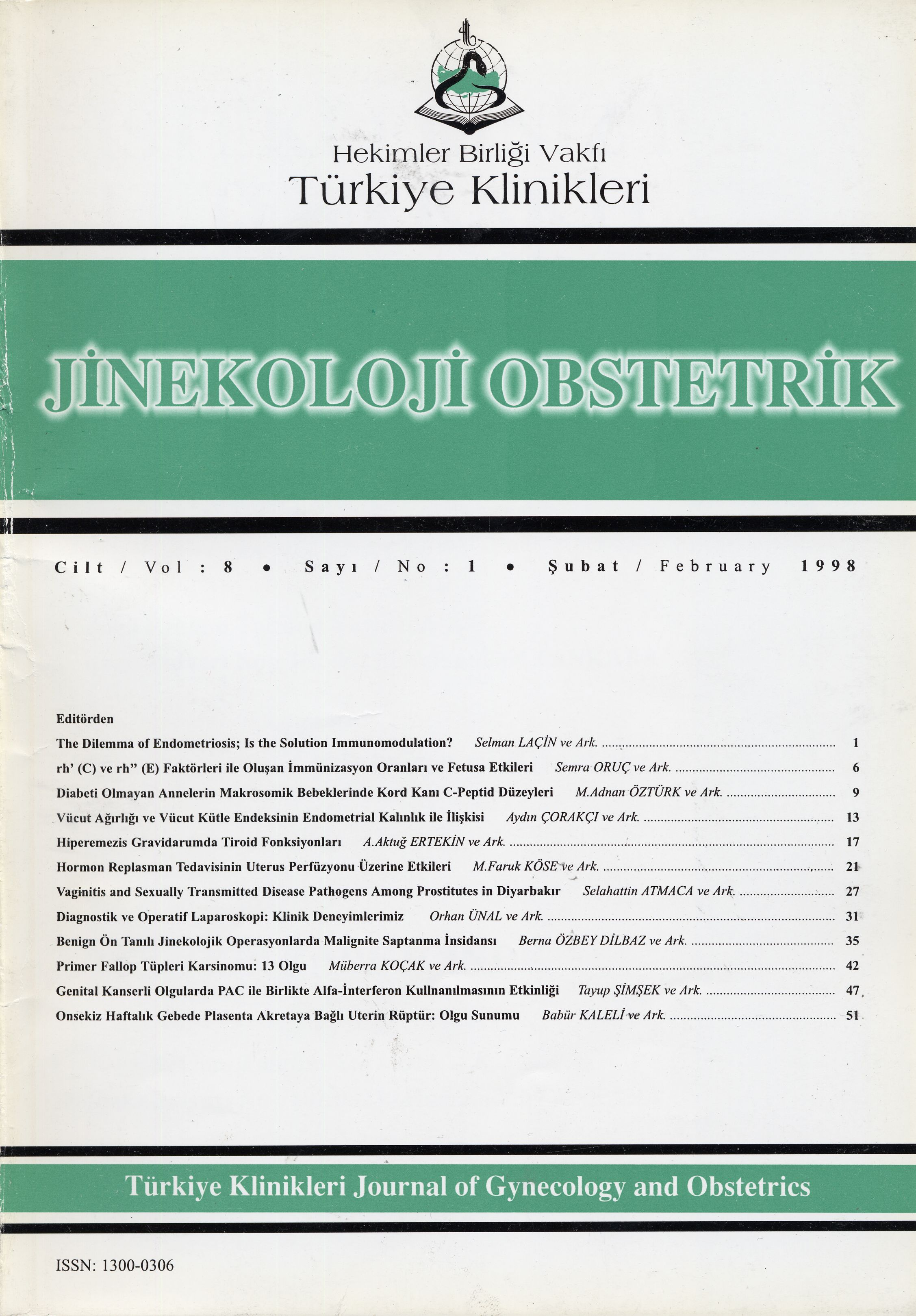Open Access
Peer Reviewed
ARTICLES
3481 Viewed1386 Downloaded
The Immunisation Rate Against To Rh'(C)and Rh'(E) And Its Effect On The Fetus
Rh'(C) Ve Rh'(E) Faktörleri İle Oluşan İmmünizasyon Oranları Ve Fetusa Etkileri
Turkiye Klinikleri J Gynecol Obst. 1998;8(1):6-8
Article Language: TR
Copyright Ⓒ 2025 by Türkiye Klinikleri. This is an open access article under the CC BY-NC-ND license (http://creativecommons.org/licenses/by-nc-nd/4.0/)
ÖZET
Amaç: rh (C) ve rh" (E) faktörleri ile oluşan immünizasyon oranlarının ve fetusa olan etkilerinin incelenmesi. Çalışmanın yapıldığı yer: Ege Üniversitesi Tıp Fakültesi Kadın Hastalıkları ve Doğum Anabilim Dalı. Materyel ve Metod: Rh uyuşmazlığı bulunan 41 gebede rh (C) ve rh" (E) tayinleri yapıldı. Doğum sonrasında kordon kanında bebek kan grubu, Rho (D), rh (C) ve rh" (E) tayinleri, total bilirubin değerlerine bakıldı. Yeni doğanların hastahanede kaldıkları süre içinde kan bilirubin değerleri takip edildi. Bulgular: Olguların 4ünde (%10) rh (C) pozitif, 36sında (%90) rh (C) negatif, 5inde (%12,5) rh" (E) pozitif, 35inde (%87,5) rh" (E) negatif saptandı. Yeni doğan kan gruplarına bakıldığında ise tümünde Rho (D) pozitif, 9unda (%22,5) rh (C) pozitif, 6sında (%15) rh" (E) pozitif saptandı. Doğum sonrası kordon kanında bakılan total bilirubin değeri ortalama 1,63 mg/ml olarak hesaplandı. Bebeklerin takibinde anne rh (C) negatif, bebek rh (C) pozitif olan olgularda istatistiksel olarak anlamlı oranda bilirubin yükselmesi olduğu saptandı (p<0.05). Anne rh" (E) negatif, bebek rh" (E) pozitif olan olgularda ise belirgin bilirubin yükselmesi saptanmadı. Sonuç: Antenatal ve postpartum Anti-D immünglobulinin yaygın kullanımı ile Rho (D)ye bağlı oluşan immünizasyon azalırken diğer Rh faktörlerine karşı oluşan immünizasyonun görülme sıklığı artmaktadır. Bu nedenle tüm gebelerde Rho (D) yanında rh (C) ve rh" (E) mümkünse Kidd, Duffy, Kell vb. gruplarının da tayin edilmesinin uygun olacağını düşünmekteyiz.
Amaç: rh (C) ve rh" (E) faktörleri ile oluşan immünizasyon oranlarının ve fetusa olan etkilerinin incelenmesi. Çalışmanın yapıldığı yer: Ege Üniversitesi Tıp Fakültesi Kadın Hastalıkları ve Doğum Anabilim Dalı. Materyel ve Metod: Rh uyuşmazlığı bulunan 41 gebede rh (C) ve rh" (E) tayinleri yapıldı. Doğum sonrasında kordon kanında bebek kan grubu, Rho (D), rh (C) ve rh" (E) tayinleri, total bilirubin değerlerine bakıldı. Yeni doğanların hastahanede kaldıkları süre içinde kan bilirubin değerleri takip edildi. Bulgular: Olguların 4ünde (%10) rh (C) pozitif, 36sında (%90) rh (C) negatif, 5inde (%12,5) rh" (E) pozitif, 35inde (%87,5) rh" (E) negatif saptandı. Yeni doğan kan gruplarına bakıldığında ise tümünde Rho (D) pozitif, 9unda (%22,5) rh (C) pozitif, 6sında (%15) rh" (E) pozitif saptandı. Doğum sonrası kordon kanında bakılan total bilirubin değeri ortalama 1,63 mg/ml olarak hesaplandı. Bebeklerin takibinde anne rh (C) negatif, bebek rh (C) pozitif olan olgularda istatistiksel olarak anlamlı oranda bilirubin yükselmesi olduğu saptandı (p<0.05). Anne rh" (E) negatif, bebek rh" (E) pozitif olan olgularda ise belirgin bilirubin yükselmesi saptanmadı. Sonuç: Antenatal ve postpartum Anti-D immünglobulinin yaygın kullanımı ile Rho (D)ye bağlı oluşan immünizasyon azalırken diğer Rh faktörlerine karşı oluşan immünizasyonun görülme sıklığı artmaktadır. Bu nedenle tüm gebelerde Rho (D) yanında rh (C) ve rh" (E) mümkünse Kidd, Duffy, Kell vb. gruplarının da tayin edilmesinin uygun olacağını düşünmekteyiz.
ABSTRACT
Objective: The purpose of this study is to detect the immunization rate against to rh(C), rh(E) and to evaluate the effect of immunization on the fetus. Instution: Ege University, Medical School, Department of Obstetrics and Gynecology. Bornova-İzmir. Materials and Methods: rh(C) and rh(E) factors were detected in 41 Rh negative pregnant women.In addition to blood groupings, Rho(D), rh(C), rh(E) , the bilirubin levels were measured in cord blood after delivery. Biluribin concentrations of newborns were followed at regular intervals. Results: Out of 41 women 4 were rh(C) positive(10%) , 36 were rh(C) negative (90%) , 5 were rh(E) positive (12,5%), and 35 were rh(E) negative (87,5%). The blood groups of the newborns were investigated and found Rho(D) positive in all cases, rh(C) was positive in 9 cases (22,5%) and rh(E) was positive in 6 cases (15%). The mean total bilirubin levels in cord blood after delivery was 1,63mg/ml. In the follow up period of rh(C) positive newborns whose mothers were rh(C) negative, we have demonstrated statistically significant high levels of bilirubin concentrations.However, in rh(E) positive newborns, whose mothers were rh(E) negative, high levels of bilirubin concentrations were not ascertained. Conclusion: While widespread postpartum and antenatal use of Anti-D immune globulin decreases the Rho(D) immunization, frequency of immunization against to other rh factors increases.Thats why we think that it will be suitable to determine rh(C), rh(E) and if possible Kidd,Duffy, Kell etc. with women Rho(D) in all pregnant women.
Objective: The purpose of this study is to detect the immunization rate against to rh(C), rh(E) and to evaluate the effect of immunization on the fetus. Instution: Ege University, Medical School, Department of Obstetrics and Gynecology. Bornova-İzmir. Materials and Methods: rh(C) and rh(E) factors were detected in 41 Rh negative pregnant women.In addition to blood groupings, Rho(D), rh(C), rh(E) , the bilirubin levels were measured in cord blood after delivery. Biluribin concentrations of newborns were followed at regular intervals. Results: Out of 41 women 4 were rh(C) positive(10%) , 36 were rh(C) negative (90%) , 5 were rh(E) positive (12,5%), and 35 were rh(E) negative (87,5%). The blood groups of the newborns were investigated and found Rho(D) positive in all cases, rh(C) was positive in 9 cases (22,5%) and rh(E) was positive in 6 cases (15%). The mean total bilirubin levels in cord blood after delivery was 1,63mg/ml. In the follow up period of rh(C) positive newborns whose mothers were rh(C) negative, we have demonstrated statistically significant high levels of bilirubin concentrations.However, in rh(E) positive newborns, whose mothers were rh(E) negative, high levels of bilirubin concentrations were not ascertained. Conclusion: While widespread postpartum and antenatal use of Anti-D immune globulin decreases the Rho(D) immunization, frequency of immunization against to other rh factors increases.Thats why we think that it will be suitable to determine rh(C), rh(E) and if possible Kidd,Duffy, Kell etc. with women Rho(D) in all pregnant women.
MENU
POPULAR ARTICLES
MOST DOWNLOADED ARTICLES





This journal is licensed under a Creative Commons Attribution-NonCommercial-NoDerivatives 4.0 International License.










